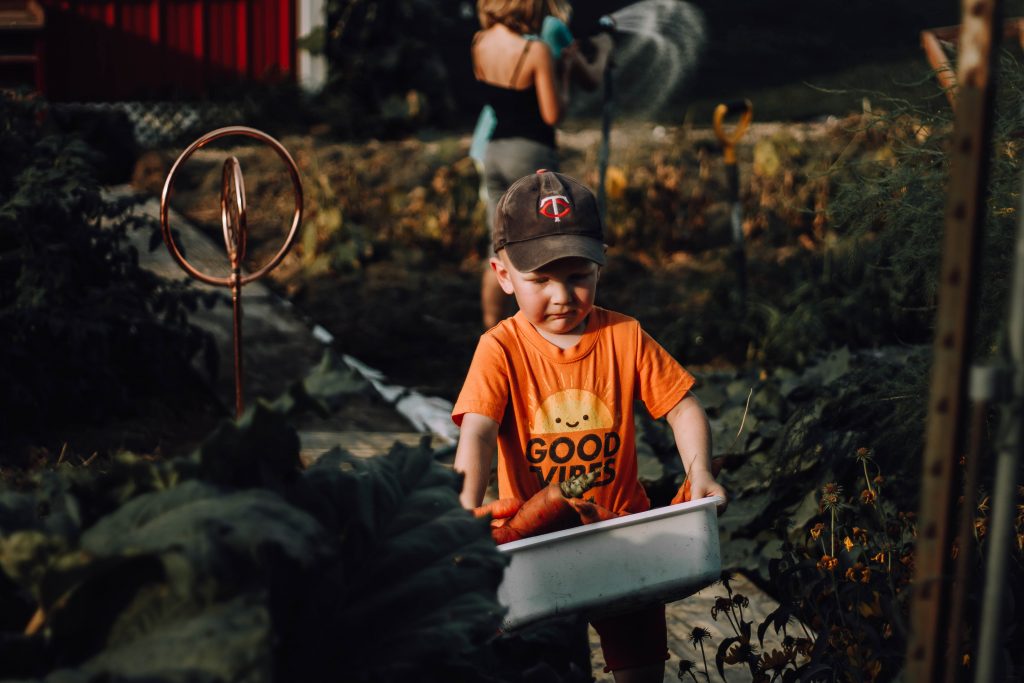Purposeful Parenting | How to Raise Responsible + Respectable Kids
Ten fantastic purposeful parenting tips for raising responsible and respectable children in today’s world.

Top 10 Tips for Purposeful Parenting!
#1. The waiting muscle- it needs to be exercised to become stronger and to build impulse control.
The waiting muscle. Did you know there was even such a muscle? I think it’s located right next to the bicep muscle 😉 We like to exercise this waiting muscle in the checkout lines at that store with the big blue letters.
We stroll up to the checkout line, with all of the other patiently waiting folks. The only difference is that I’m ready for it. I’ve thought about this since the last time we were in this spot. What could go wrong? What situations might we encounter here while we wait? And what am I prepared to do about it?
I like to start in before the kids even have a chance to start. In a quiet voice, almost as if to myself, I say, “I think I’d like some gum.”
They look at me, as if I’ve had the most brilliant idea. Practically shocked that they didn’t even need to bring it up. Finally, she’s thinking like us!
“Oh, but I remember the last time I bought gum and it was just last week”.
“Maybe we’ll wait another week before buying gum again.”
Just like that our waiting muscles get flexed two-fold. 1. we are in line 4 shopping carts deep and 2. we’ll wait until next week, or whenever I don’t get asked about buying gum or a special treat.

#2 Chores are necessary, not optional
(This post may contain affiliate links which means I make a small commission at no extra cost to you.)
Charles Fay says, we have a basic human need to feel needed or included. When we need our children to contribute to the family household, they feel needed and useful. When they feel needed and useful in a positive way at home, they are less likely to seek that same feeling, but only in a negative way- somewhere else.
Experts say kids are even happier when they do chores or contribute to our home. It feels good to contribute.
All you have to do, is ask a kid whose completed their chores, “how’d that feel, to get that all finished up?”
What should our kids be taking care of?
I like to say, “if a child can, a child should”. Can they pack their own lunch? Watch the clock in order to catch the bus on time? Remember their school folder?
Daily tasks like setting the table, helping make supper, emptying the dishwasher, trash collection and removal, getting the mail, picking up dog waste, collecting, sorting and folding laundry etc…
Chores come before homework in a few homes, I know well. Many families believe that building character is more important than grades.
From Bad Grades to a Great Life is a good read and reiterates this notion!
#3 Impulse control will not be learned by being obedient
Children can not be disciplined to control their impulses. They need to understand the reason why and have a strong buy in before they are able to control their own impulses.
“Inhibitory Control is the the ability to resist a strong inclination to do one thing and instead do what is most appropriate” Adele Diamond
The example that our particular group was given to work through was teaching impulse control when it comes to snacks and food.
We talk about how sometimes we are hungry when we are tired, bored or always surrounded by food, in the kitchen. And then there’s “hangry”. No one needs to get to this point. The combination of hungry and angry simply do not mix and you give in to a graham cracker! 🙂
Does this make it ok to eat a snack at 11:45am when we know that lunch is just around the corner?
Some thoughts were to use a closed sign in the kitchen between meals. Model self control with food or snacks or find something else to do for a bit while we’re waiting for the next meal. Or just get out of the kitchen. This happens to be the main hub of our home, so this can be difficult sometimes.
And isn’t it just science that after supper you sit down to watch a movie with the kids and the first commercial that comes up is a blue bunny ice cream commercial? Food seems to be everywhere on tv and makes us hungry even if mom just spent the afternoon making a lovely supper.
#4 You get more of whatever you pay attention to
You want the level of volume to gradually rise in your household? Then you should definitely yell to the kids who are yelling at each other, in the next room.
Or maybe you’re like me and have stood over your flailing child throwing a temper tantrum on the floor and wondered to yourself…I wonder how we get this to stop?
So instead of hovering over the child who is mad about not getting to have a cookie at 8am in the morning. You decide to walk away, giving this negative behavior no attention and you might be surprised how fast things clear up. It might take a while in the beginning, but they’ll find out that they’re the ones spending the energy on this, and not you.
Wise parents take things slow.
I eventually learn to not pay attention to the stuff that I don’t want to continue. Sounds simple doesn’t it?
A post-it note adorned to our family refrigerator read: Whatever You Give Attention To- GROWS. This goes for both positive and negative behaviors and attitudes.
On the positive end, we tend to notice with great exuberance that the kids decided to take care of their chores without us having to remind them. And then we walk away so to avoid saying some sort of empty phrase like “good job”, “awesome”, “way to go”! Just notice and walk away- forget the praise.
This stuff doesn’t just have to apply to raising up kiddos. This goes for work place management too! This goes for any relationship you have with another person.

#5 Stop praising your kids
I know, I know, it sounds appalling to say out loud, doesn’t it? Stop praising our kids?
One day after reading this amazing article, I decided to tally up how many times, I said, “good job” after our kids did something…anything. It just shot out of my mouth for no real good reason. Before the end of the day I was up to 45. Forty-Five times I said, “good job” either alone or to round off a sentence. Ugh!
What are we telling our kids when we say something like “good job”. We say, you have please me and you should always strive to please me. It’s an empty phrase that has come to mean nothing to our kids. Or on the flip-side we can condition our children to constantly crave praise. I call it praise addiction.
You might notice this after you’ve decided to simply notice what your kids are doing without saying “good job” after noticing. They might look at you like, but aren’t you going to say good job? 😉 This is when you know you could afford to cut back on your praising.
A bit of praise every now and then is not going to damage our children, but when it’s an unhealthy dosage it has detrimental effects. Everything in moderation, folks!
I want our children to please themselves and make decisions that create consequences that affect them, not me.
As the oldest child in our family, I always feel like I’ve been a people pleaser and have to work hard to realize that I have to do things for myself and not others.
We work hard at this with our oldest, who has the same tendencies.
#6 Focus and attention can be affectively taught by modeling
How do you teach a kid to do anything?
Use the toilet, do the dishes, concentrate or sit still without needing to be entertained? Model this behavior with great enthusiasm and joy.
Teaching kids to have patience and focus is one of the skills that we can teach simply by modeling it. Raelene Ostberg discussed strategies to promote focus and attention. One of these strategies is avoid interrupting, taking over and allowing children to solve their own problems. Practice solving challenges together.
How many times have we heard our neighbors say, “sit still, and I mean it!” That’s energy draining. After all, can we really control someone in that way? Is this effective? Have you ever watched a kid get more wiggly after hearing this?
I am the only person I can actually control. Once you come to learn this, it’s pretty freeing.
How do you get your kids to sit still in a dentist waiting room? Pick up a magazine from the waiting room, open it up and begin to read it, flipping through the pages. LEAVE your PHONE alone! Don’t even bring it out.
I have come to think of this thing in my pocket as the last thing we might ever need. If there’s a hostage situation here at the dentist office, we’ll get it out to call for help, ya get me?
Might this be tough for some? It’s a real struggle to know that you could get through a few emails, check the social newspaper or snap a photo of your kids in the waiting room. And don’t we all have the PBS app on our phones just in case $&!% hits the fan?
But is it better for our kids to think, look, even my parent can’t sit for 5 minutes before NEEDING to be entertained by their phone? Or might it give them some actual real life skills to watch you entertain yourself without needing technology.
Or heck…what if you just sat and talked about the day or just enjoyed the quiet. People watching is our favorite!
Could this skill transfer to an airplane ride, church or a sporting event?
Teach your kids how to have focus and attention for at least 1 hour when their little and you’ll thank yourselves later in life.
#7 Relationship building and empathy should be top priority
The Parenting Professor, Chris Peterson discussed the need for relationship building in our schools and at home with our kids. He says that without a relationship, kids are far less likely to have a buy-in to what we will be teaching.
I loved this video from Ms. Rita Pierson. Watch as she discusses some power ways to be an effective teacher and parent and why relationships are far more important than grades.
Many of you may notice when our children start to act up. Think back…have the days been busy? Have we been running around so much, that we’ve forgotten our daily squeezes and hugs and loves on our kids?
I know it happens in many homes I know well. We recognize that perhaps our tone has been hasty and rushing and just like that we notice an increase in crabbiness or negative attitude in our kids. Strange?
Is there a connection between the two? You bet!
This relationship + empathy piece is more important than anything else! If you have no other skills, learn to be empathetic.
#8 Snow plow parenting
Have you heard of the new snow plowing parenting that has gotten so popular lately? Maybe you’ve heard about it in the news lately.
Snow plowing is starting up your big snowplow truck and removing any obstacle that might be in the way of your child’s success. Of course this is all done out of love, right?
What do we tell our kids when we remove all of the obstacles out of the way for them? Charles Fay of the Love and Logic Institute and Chris Peterson both agree that we tell our children that “you are not capable of handling this on your own”.
And indeed if we have not given them plenty of time to make their own cause and effect life when they are young, then it’s likely that they are not capable of making these decisions and handling problems on their own.
What should we do instead? See #10
Wise parents allow their children to make lots of mistakes when the price tag is small. So that when the price tag is life and death, they already have a good sense of what it is like to fail and what it is like to succeed.
#9 Helping Children Learn Responsibility
At Love and Logic, we believe that the most powerful way of learning to make good decisions is by being allowed to make some small mistakes, experiencing the related consequences, and seeing that the adults around you love you even when you mess up.
Far too many parents rob their kids of such opportunities by making sure that their kids never make mistakes, bailing their children out of the consequences of their mistakes, or creating resentment by showing anger or rejection.
Listed below is a process for avoiding these common mistakes:
- Give your children plenty of opportunities to make decisions over small issues. Examples include giving your child a small allowance, allowing them to “choose” whether they remember to bring their lunch to school, or letting them decide whether they want to wear their coat or carry it.
- Hope they make a poor decision. Children learn to make good choices by making poor ones and experiencing the consequences.
- Let empathy and logical consequences do the teaching. Empathy is the key! By being sad for our kids rather than being angry at them, they are allowed to focus on their poor choice rather than our anger.
- Give them the same decision-making tasks again. This communicates a strong message: “We believe that you’ve got what it takes to learn from your poor decisions.”

#10 Remember to strive for progress not perfection!
I had the opportunity to meet so many new inspired learners through-out this week. Surely you have something that you learned this week.
(This post may contain affiliate links which means I make a small commission at no extra cost to you.)
Watch the Parenting Professor and I Ruminate in Red Chairs. Unscripted, raw and purposeful parenting methods.
More Hearty Parenting Posts
Parenting Anxiety | How to Stay Calm at Home
Traveling with Kids | Staying Sane
How to Practice Patience with your Kids at Home
Drop something new you learned this week, that inspired you, in the comments below!
Do you find these posts interesting to you? Sign up to receive free updates when a new post is published.
If you feel moved to do so, Follow us on Instagram and Like and Share us on Facebook!

Affiliate Disclosure & Content Disclaimer
This post may contain affiliate links from a paid sponsor, Amazon or other program. When you use these links to make a purchase I earn a small commission at no extra cost to you. This allows me to continue creating the content that you love. The content in this article is created for information only and based on my research and/or opinion.
Emily T.
Leave a Reply
DAILY INSPIRATION ON THE GRAM @hearty.sol
it's hip to be square!
I learned about compassion fatigue. It is important to take good care of oneself before we can best help others. Might this also be true for parents?
Chris, just like when you’re on an airplane! The flight attendants instruct to put on your own oxygen mask before assisting others. This should be treated the same in parenting, teaching and any other aspect of life!